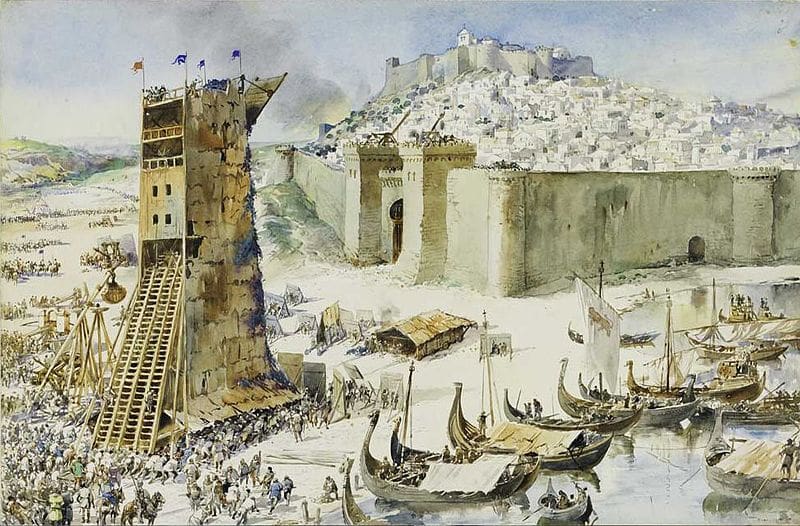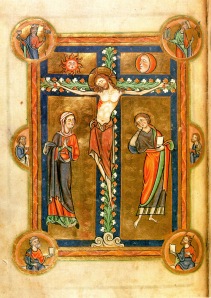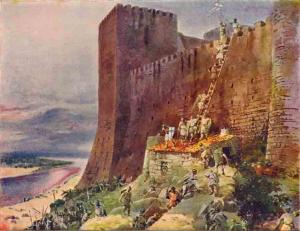[…] of the altar, or to dedicate themselves to the service of Jesus and Mary in prayer (check out this post for some knightly spirituality). Real men pray. Let’s talk about […]
A blog for Catholic men that seeks to encourage virtue, the pursuit of holiness and the art of true masculinity.
A Sermon on the Eve of Battle

The year is 1147. Knights and soldiers from around Europe are gathered at the gates of the great city of Lisbon on the eve of a monumental battle with the Muslim occupants. They have erected a giant moveable engine to scale the gates (like the kind in Lord of the Rings). Their enemy is merciless, and they know full well they face the high likelihood of death. Their thoughts turn toward eternity and the judgment seat of Christ. A humble priest stands before these battle hardened men and delivers a sermon to give them courage and inspire them to repentance and action.
That is the context of the text I am about to share, taken from the fascinating little book, De expugnatione Lyxbonens, or The Conquest of Lisbon—-a firsthand account of an epic battle written by an anonymous source. Without getting into the details of the reconquista, suffice it to say that Muslims from Africa had conquered large portions of what is now Spain and Portugal, and the Catholic soldiers were fighting to free themselves from their rule.
I share this text because it provides a rare glimpse into the heart of medieval piety, as well as the deep devotion of Catholic men in the Middle Ages. Try to read it all if you can.
The sermon is quite long, and believe it or not, I have edited out some portions for brevity. I have also added section headings to make it easier to follow the priest’s train of thought. Finally, keep in mind that I typed this by hand early in the morning, so don’t be surprised if you find some typos!
Come brothers, a struggle is at hand. The work grows hot; the enemy presses.
 Let no one be afraid. For it is a great comfort to human frailty that everyone has a guardian angel assigned to him; and, in order that you may respond in accordance with the character of this most holy guardianship, let the text of St. Paul, the teacher of the gentiles, point the way—the text in which he says to the Romans, “Render to all their dues, honor to whom honor is due.” For this seems to me to mean that due honor is rendered, if that which is due to righteousness is paid and no concession is made to unrighteousness.
Let no one be afraid. For it is a great comfort to human frailty that everyone has a guardian angel assigned to him; and, in order that you may respond in accordance with the character of this most holy guardianship, let the text of St. Paul, the teacher of the gentiles, point the way—the text in which he says to the Romans, “Render to all their dues, honor to whom honor is due.” For this seems to me to mean that due honor is rendered, if that which is due to righteousness is paid and no concession is made to unrighteousness.
Be truthful and repent of disobedience
And likewise to truth, if that which belongs to it is so rendered that nothing is left to falsehood; and also to wisdom and innocence and goodness, if all is so granted that we allow nothing of theirs to folly or raft or malice. For, if on any occasion whatsoever you have suppressed that which is true, you have not rendered due honor to righteousness and truth, but you have dishonored righteousness and insulted truth; and since Christ is righteousness and holiness and truth, if you have trampled upon righteousness, you are like those who buffeted Christ, spat in his face, smote his head with a reed, and put a crown of thorns upon his head.
And if you have deviated from the guidance of your angel, take care to be reconciled with the Lord through penance; and through obedience to the commands of God, try to return to the place from which through disobedience you have fallen….
But because it is said, ‘Wisdom will not enter into a soul that deviseth evil,’ put away malice from among you, for to do evil is nothing but to depart from discipline. Brothers, as the apostle teaches, seek that wisdom which is above, not which is on the earth. But only the pure in heart are able to attain it…. [T]he understanding is better when it forgets itself before God, and, for the love of the immutable God, esteems itself as nothing in comparison with him.
The desire for power and the evil of pride
 But if it should, so to say, easily be pleasing that it desire to exercise its power perversely to imitate, God, it diminishes itself to just the extent that it wishes to enhance itself. At this point enters pride, the beginning of all sin; and the ‘beginning of man’s pride Is to apostatize from God.’ And to the pride of the Devil was added most spiteful envy, in order that he might tempt man to that through which he perceived himself to have been damned. Wherefore it has happened that corrective rather than destructive punishment has been so allotted to man that whomsoever the Devil has offered himself for the imitation of his pride, the Lord has offered himself for the imitation of his humility.
But if it should, so to say, easily be pleasing that it desire to exercise its power perversely to imitate, God, it diminishes itself to just the extent that it wishes to enhance itself. At this point enters pride, the beginning of all sin; and the ‘beginning of man’s pride Is to apostatize from God.’ And to the pride of the Devil was added most spiteful envy, in order that he might tempt man to that through which he perceived himself to have been damned. Wherefore it has happened that corrective rather than destructive punishment has been so allotted to man that whomsoever the Devil has offered himself for the imitation of his pride, the Lord has offered himself for the imitation of his humility.
The humility of Christ
And so the Son of God became man and in that capacity bore with patience human sufferings, in order that, as he had suffered condemnation in the flesh and spirit, so there should be eternal salvation in the flesh and spirit. Therefore, in place of Adam, who became a sinner, Christ, who was without sin, is brought in, in order that by his voluntary sacrifice, he might be saved who had suffered unwillingly.
But in this connection, the most vile of all people, the Moors, taunt us with the quest why God in his wisdom could not have delivered man except by becoming a man and being born of a woman and suffering all those things at the hands of sinners. Of course he could have done so. But, if he had done otherwise, he would displease them in their folly just the same. For, if the eternal light which is seen through the inner eye appears not to the eyes of sinners, it could not be perceived by the mind of the defiled. But now because, in order to prepare for things invisible, he deigns to forewarn us visibly, he offends the avaricious because he has not a body of gold; he offends the shameless because he was born of woman; he offends the proud because he patiently endured insults; the timid because he died.
Why Christ became a man
 And in order that they may appear to defend their vices, they say that the these things offend them not in man but in the Son of God. But the Son of God, according to the belief and worship of the universal church, became man in order hat as such he might endure human sufferings. This is a medicine for men of such strength that its potency passeth understanding.
And in order that they may appear to defend their vices, they say that the these things offend them not in man but in the Son of God. But the Son of God, according to the belief and worship of the universal church, became man in order hat as such he might endure human sufferings. This is a medicine for men of such strength that its potency passeth understanding.
Oh, medicine that healeth all sickness, reducing swellings, restoring corruptions, cutting away the superfluous, preserving the necessary, repairing losses, correcting distortions! What pride shall be cured, if it be not cured by the humility of the Son of God? What greed if it be not cured by the poverty of the Son of God? What proneness to anger if it be not cured by the patience of the Son of God? What impiety is there which is not cured by the love of the Son of God? Lastly, what fear can be cured, if it may not be cured by his resurrection?
Persevere in grace
And you, most dearly beloved bretheren, who have followed Christ as voluntary exiles and have willingly accepted poverty, hear and understand that the prize is promised to those who start but is given to those persevere. Yet he cannot persevere who still loiters at the beginning of a worthy enterprise in ignorance and neglect. Let the neglectful with all diligence bring forth ‘fruits worthy of repentance’ in order that he who remembers that he once acted unlawfully may become accustomed to abstaining from unlawful acts.
For, brothers, if you wish God to forgive your sins, pray that his grace may so anticipate you that he may deem your desire worthy of consummation in his blessings. Therefore, at the beginning of your conversion the greatest care must be exercised lest your affections still cling to those very things which you have given up; for there will surely some day be outer punishment for what now lies concealed in a guilty conscience.
Be reconciled with God
Be reconciled again with God, and put on Christ once more in order that you may be his immaculate sons. Remember the marvelous work of the Lord which has wrought in you, when, after you had been cleansed by the new baptism of repentance, you were going forth from your country and kinsmen, how he has brought you unharmed over the vast waters and through violent storms, and how he has also brought you hither, where through the inspiration of the Holy Spirit we have invaded this suburb in which we still remain, and how, not without an evident miracle, it has been taken almost without bloodshed on the part of any of our men.
 Therefore, show yourselves once more in this undertaking such men as you were when you arrived here, and I confidently promise you that you will shatter the power of your enemies. For it is not I but the Lord, who always grants and shows favor to those who make a worthy request, and who is accustomed never to deny forgiveness to those who make confession.
Therefore, show yourselves once more in this undertaking such men as you were when you arrived here, and I confidently promise you that you will shatter the power of your enemies. For it is not I but the Lord, who always grants and shows favor to those who make a worthy request, and who is accustomed never to deny forgiveness to those who make confession.
The enemy will not stand against you because those whom the error of ignorance of the faith degrades, torment will surely strike with a difficulty of action. Brothers, be not afraid; shun discouragement; despise terror. If our God has prevented you from entering this city after so long and costly an effort, assuredly he has done this in order that continuous labor might strengthen your patience, and that the same, being strengthened, might make you the better tested of perseverance. Now brothers, at last arouse yourselves and grasp your arms, for not with the Giants or the Lapithae must you fight, for your enemies are thieves and robbers, helpless and afraid, who crowded as they are by a clutter of trash, will be hampered by their confused and disordered multitude.
Behold the wood of the Cross
[The priest speaking possessed a relic of the True Cross] Behold brothers, behold the wood of the cross of the Lord. Bend your knees and lie prone upon the ground. Strike your guilty breasts while you await the aid of the Lord. For it will come, it will come. You shall perceive the help of the Lord above you. Adore Christ the Lord who on this wood of the saving cross spread out his hands and feet for your salvation and glory. Under this ensign, if you only falter not, you shall conquer. Because, if it should happen that anyone signed with this cross should die, we do not believe that life has been taken from him, for we have no doubt that he is changed into something better. Here, therefore, to live is glory and to die is gain.
Brothers, I myself, a participant in your trials and labors and a sharer in your rewards, desire that it may be done to me even as I promise that it shall be done to you. With God’s aid, I, the guardian and inseparable companion of this sacred wood, will remain with you in this engine while life shall last. I am persuaded that neither famine nor the sword nor tribulation nor distress shall separate us from Christ. And being actually certain of victory, fall upon the enemy, the rewards of victory over whom are eternal glory.
Final blessing
May the God of peace and love, who maketh one out of two and delivereth us mutually one to another; who raiseth up the poor out of the dust and lifteth the needy out of the dunghill; who ‘chose David his servant and took him from the sheepfolds, although he was the younger of the sons of Jesse; who giveth his word with mighty power to those who proclaim the gospel unto the perfection of his preaching and the display of his works—holding us by the hand, may he direct us in accordance with his will and receive us with glory; may he so control us who lead that we may rule over his flock with discipline and not with the instruments of a foolish shepherd. May he supply courage and strength to his people. And may he exhibit the flock clean and white and spotless in all respects and worth of the heavenly fold, wherein is the abode of those who rejoice in the splendor of the saints; so that in his temple we all, both the flock and shepherds, may say, “Glory to our Lord, Jesus Christ, to whom be glory for ever and ever.” Amen.
At this word, all fell down upon their faces with groans and tears. And again at the command of the priest all stood up and were signed with the revered sign of the cross of the Lord in the name of the Father, the Son, and the Holy Spirit. And so at last, with a loud voice calling on God for aid, they moved the engine forward some fifteen cubits towards the wall.
Don’t Miss a Thing
Subscribe to get email notifications of new posts and special offers PLUS a St. Joseph digital poster.
Related
COMMENTS
Reader Interactions
Comments
Trackbacks
-
-
[…] of the altar, or to dedicate themselves to the service of Jesus and Mary in prayer (check out this post for some knightly spirituality). Real men pray. Let’s talk about […]
“Come brothers, a struggle is at hand. The work grows hot; the enemy presses”
Our circumstances haven’t changed greatly since then.
It is valuable to contemplate what those men faced at Lepanto, Tours, Vienne. All victories but how could they know? Or, those who faced defeat and death at Constantinople?
What a God inspired sermon! I would want to hear this priest speak if I were preparing for battle. It was all about Our Lord, fight the good fight and die if need be – free of sin. Be brave in the face of our enemies!
Oh to have sermons such as this when we must stand and fight against secularism, vices, hatred of our Catholicism, feminism, abortion, etc., etc.
Great post. Great sermon. As a portuguese born and raised in Lisbon I’m sad that this is the first time that I hear about this sermon because it certainly had a great influence on our victory over the moors. Unfortunatly it’s just one of those things we don’t hear about in history class. Thank you very much for sharing this. God bless.
Muito bonito.
I have been to the castle twice, and know a little bit of the history ( from what I could find online ) . But this sermon brings another aspect to it, wish I had been able to read it before my previous visits.
Also you might be interested in checking out a recently( within the past few years) canonized Portuguese saint. St Nuno Alvares Pereira.